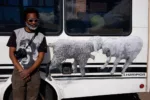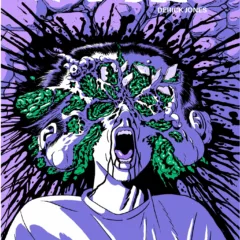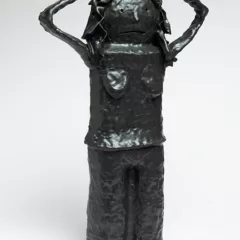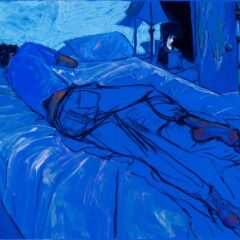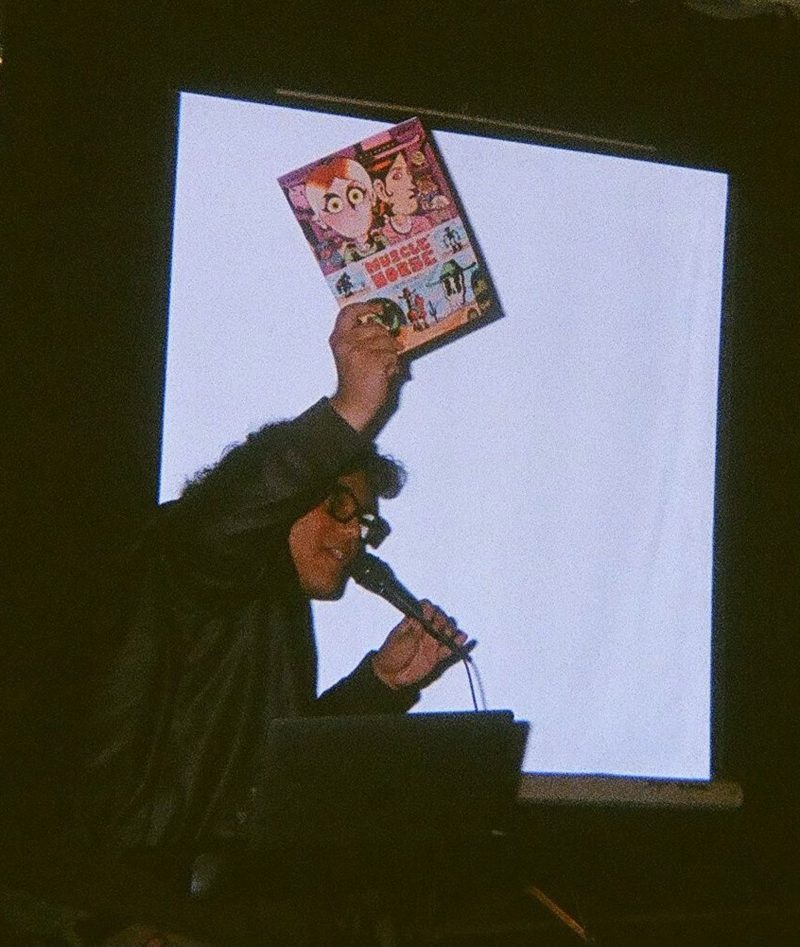
Last month, Nate Garcia quit his job as a caricature artist at the Philadelphia Zoo to draw comics full-time. This was not his first big change in pursuit of cartooning: in 2020, after graduating high school, he moved from his parents’ house in Allentown, PA, to West Philly in order to work on zines. Nate self-published the first issue of his one-man anthology Hornrim later that year. Since putting out two more issues of Hornrim, he has published three comics about Alanzo Sneak, a sneaker-wearing cowboy, and his horse, Sheena, including Muscle Horse and, most recently, Gecko. You can find Nate’s work at his webstore, on his Instagram, or on the shelves at Partner’s and Son at 6th and Bainbridge. Last week, just a few days shy of his twentieth birthday, I talked with Nate about his comics—where they came from, why he makes them, and what future work might be in store. Our conversation has been edited for length and clarity.
When did you start making comics? Tell me the origin story.
I started making zines in 2008. My first-grade teacher Kimberly would have all these horrible stories about her roommates and her ex-boyfriends and concerts and house shows. She would just tell all these really interesting anecdotes, and I would just make these stapled little books about them. I’d give her every single one and it happened so much that she would start leaving folded, pre-made zines in my take-home folder, and I would come back the next day with a full comic.
So an early start.
Yeah, early as hell. I was really inspired by Bone by Jeff Smith and Toy Story and the Spider-Man movies. And then I saw Mutants, Monsters and Marvels, Stan Lee in conversation with Kevin Smith, a DVD from 2003. I never truly fell in love with superhero comics. I really just wanted to hear about the stories of these tortured Marvel artists drawing like 30 pages a week, probably more. I remember feeling this inner competition with Jack Kirby, like, I feel like I have to do that. I have to draw 30 pages a week. I never did.
I kept making comics till maybe second grade and then in third grade took a hiatus. In fourth grade, I got really inspired again. I was making up these stories about me and an imaginary friend, Scott. They were called Nate and Scott comics. Scott did not exist. I just really wanted a best friend, like in a TV show. Like Phineas and Ferb, they’re step brothers, but they’re best friends. I wanted that. And so I manifested it into a comic. Then in high school I stopped because I wanted to play in a band and be cool and stuff. So I wasn’t doing comics at all until like 2019, 2020 really hit and boosted my ass to start working again. I felt f•••ing free.
What are your biggest artistic influences now?
My influences now are all over the place. I’m so happy with what I know now. I’d hate to be as lost as I was in 2020, not knowing shit. I’ve read so much now. Specifically, I’m really inspired by old Dan Clowes, Hernandez brothers, and Robert Crumb. I love a lot of new stuff. Stuff I’m reading now is pretty much just my friends, like Josh Pettinger’s Goiter and Jasper Jubenvill. I’m really inspired by Simon Hanselmann’s work and Nathan Cowdry’s work, too.
You’ve talked about drawing caricatures. How did that develop into making comics and how much has that influenced your work? I definitely see some stylistic similarities between what you do now and caricature drawing.
There’s an amusement park called Dorney Park right by my old house where I used to live with my parents. When I was about 13, my mom was doing all these babysitting jobs in the morning, so she’d drop me off. I had a season pass—it was kind of like daycare. I wouldn’t go on any rides, I would just watch the caricature artists all day. And they’re just kids, too, like 17, 18. I was like, “F•ck, I really want to work here.” The next year I became legal at 14, and I got the job. But live caricature is one of those things where you can be really good at drawing, just like comics, but you put yourself out there and you don’t know how to do shit. It’s hot outside, you’re drawing in front of people, and you’re drawing all day. It was not good.
I didn’t go to art school, so I kind of think of those six years as education. You learn how to talk to people, get out of your shell, and you learn how to be a horrible sleazy sales person. Your hand is just in so much f•••ing pain, and it’s hot, and the marker’s slipping off, and you get ink on the paper. There’s been a lot of rejects and a lot of angry people, but it’s all part of learning. And I think that helps a lot with self-doubt and endurance. I’m always insecure with my comics. Like, I don’t think I’ve ever made one that I’m ever going to be a hundred percent happy with.
How does your earlier work look to you now?
I’m just constantly, constantly, constantly chasing this perfect ideal of a page that I will never reach. And I’ve never even gotten close to it. It’s like a blessing and a curse because it really is what keeps you going. It could be something so much better and it never is. But sometimes you do get a comic in a good spot. This has been said a million times by million cartoonists, but I’ll say it again: The best part is when you’re just enjoying the moment of making it. Because there’s no reward at the end. You always think as you’re doing it, “I f•••ing can’t wait to see this book. I can’t wait to see this object. I can’t wait to have it.” And you’re always chasing that. But you’re not going to actually like it. It’s always anticlimactic and it’s always shittier than you think. So just enjoy making the page in the moment and being in the zone. When I’m in the zone, that’s f•••ing heaven. That’s always what I’m chasing.
Every last thing I put in the category of early work. It always looks weird to me visually, and what I’m most insecure about is the story. I feel like I don’t know what the f•ck I’m doing half the time, and I think it’s really obvious. But that’s why I really love the episodic, slowly evolving way of making stuff. I really like thinking of it like seasons of a TV show. The first few seasons are weird, but it gets really good in season five. That’s where I’m trying to be.
How do you balance that desire for the visually perfect page and the really entertaining story?
It’s easy to get caught up in how things look. That’s when you start making shitty comics, when you get too obsessed with visuals. Stuff that’s designed well and looks nice is not always what reads well, and it’s really easy to get your brain confused and start making unreadable pages. It’s really easy to get caught up in that trap. I strive for readability, always. I’m not trying to be deep or experimental, I just want to make it funny and entertaining.
Do your parents read your comics?
My favorite part is showing my dad or my mom and seeing them flip through it. After not really showing anybody for however long this stuff takes, and then they see it, it’s rewarding, even if it’s bad. Seeing someone look through it is all the reward that there will ever be. When you get the book, you’re not happy with it, but someone else, they’re not going to know what’s wrong with it. You have two seconds of bliss.
What kind of future projects do you have in mind? What stories, genres or styles do you still want to explore?
I just feel like I haven’t even gotten to the place I want to be with anything. I don’t feel like I’ve conquered anything. I still want to hone what I’m trying to hone now, which is fun, entertaining, readable comics. Like Scooby Doo on paper, but not so formulaic.


